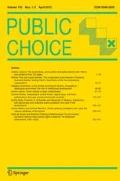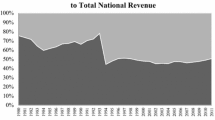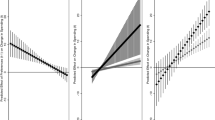Conclusions
The empirical results which have been reported support the hypotheses' implied by the model of rational political behavior set out in Section 2. In pre-election periods, local government development expenditures deviate significantly from their normal levels. The extent of deviation is approximately 20%.
Consistent with the predictions of this model, it is found that incumbents not seeking re-election deviated far more in their pre-election discretionary budget expenditure than incumbents seeking re-election. The expenditure gap between the two types of incumbents is large and statistically significant. Incumbents not seeking re-election exhibit a deviation equivalent to 47% of the development budget, while those seeking re-election exhibit a 12% deviation.
The theory and the empirical results contradict, at least for the case of local governments, the conventional arguments that intertemporal asymmetries in government expenditures are the consequences of attempts by incumbents to increase political support, and that such attempts can succeed because the public is myopic or irrational. On the contrary, the empirical results in this paper support a theory of rational behavior where asymmetric intertemporal expenditures in pre- and post-election periods derive from an incumbent's perception of the likelihood of failure in a re-election quest, or an incumbent's decision to leave political office.
Similar content being viewed by others
References
Amacher, R.C. and Boyes, W.J. (1982). Unemployment rates and political outcomes: An incentive for manufacturing a political business cycle. Public Choice 38: 197–203.
Beck, N. (1982). Does there exist a political business cycle: A Box-Tiao analysis. Public Choice 38: 205–209.
Ben-Porath, Y. (1975). The years of plenty and the years of famine: A political business cycle? Kyklos 28: 400–403.
Brennen, G. and Buchanan, J. (1980). The power to tax: Analytical foundations of fiscal constitution. New York: Cambridge University Press.
Buchanan, J. and Tullock, G. (1962). The calculus of consent. The University of Michigan Press.
Downs, A. (1957). An economics theory of democracy. New York: Harper and Row.
Frey, B.S. and Ramser, H.-J. (1976). The political business cycle: A comment. Review of Economic Studies 43: 553–555.
Ginsburgh, V. and Michelp, P. (1983). Random timing of elections and the political business cycle. Public Choice 40: 155–164.
Hillman, A.L. (1989). The political economy of protection. New York: Harwood Academic Publishers.
Hillman, A.L. and Riley, J. (1989). Politically contestable rents and fransfers. Economic and Politics 1: 17–39.
Lachler, U. (1978). The political business cycle: A complementary study. Review of Economic Studies 45: 369–375.
McCallum, B.T. (1978). The political business cycle: An empirical test. Southern Economic Journal 44: 504–515.
MacRae, D.C. (1978). A political model of the business cycle. Journal of Political Economy 85: 239–263.
Minford, P. and Peel, D. (1982). The political theory of the business cycle. European Economic Review 17: 253–270.
Nordhaus, W.D. (1975). The political business cycle. Review of Economic Studies 42: 169–190.
Peltzman, S. (1976). Towards a more general theory of regulation. Journal of Law and Economics 19: 211–244.
Tullock, G. (1976). The vote motive. Hobart Paper No. 9. London: Institute of Economic Affairs.
Author information
Authors and Affiliations
Additional information
This paper is part of a major research project on political business cycles which is financed by the International Center for Economic Growth and the Israel Center for Social and Economic Progress.
Rights and permissions
About this article
Cite this article
Rosenberg, J. Rationality and the political business cycle: The case of local government. Public Choice 73, 71–81 (1992). https://doi.org/10.1007/BF00142917
Received:
Accepted:
Issue Date:
DOI: https://doi.org/10.1007/BF00142917




